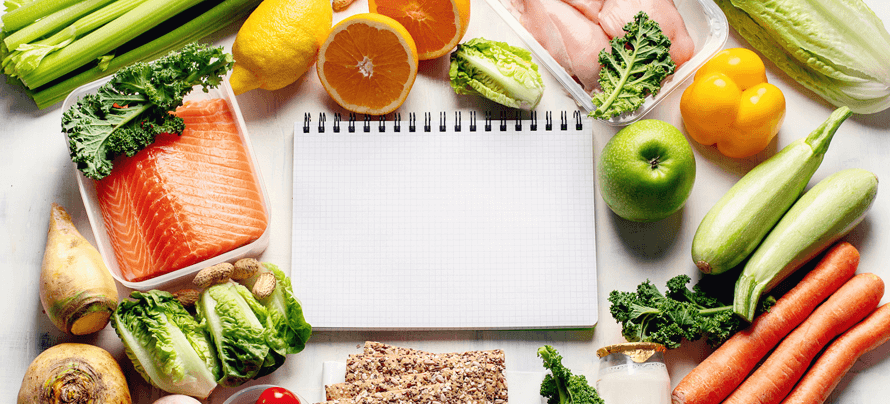Key Takeaways
- For most people, keeping weight off is much more difficult than losing it because they slide back into the same habits that made them overweight in the first place.
- By dropping a few “bad” eating and exercise habits and adopting better ones, weight maintenance becomes significantly easier.
- Keep reading to learn the 12 best habits for staying lean for life.
The Centers for Disease Control (CDC) estimates that on average, about half of Americans try to lose weight in any given year.
And many of them do lose weight—sometimes quite a lot.
Unfortunately, however, most of those who succeed don’t stay that way for long. Instead, they gradually regain the weight until they’re back to square one (or even heavier).
A striking example of this comes from an early study on obesity conducted by scientists at the University of Pennsylvania, which found that after two years, only 2% of obese men and women were able to maintain a weight loss of at least 20 pounds.
A more recent review study conducted by scientists at Brown Medical School estimated that only about 20% of overweight and obese people who lose weight are able to maintain most of their weight loss a year or more afterward.
Even if you’re aren’t overweight, you’ve probably experienced this firsthand—once you understand the grammar of weight loss, it isn’t complicated or even all that difficult.
Making your new, low weight the new norm is the real bear because while piss and vinegar alone is about all it takes to drop pounds, weight maintenance requires a whole different approach to eating and living.
To stay lean for the long-haul, you need to know how to shift from a tactical mindset to a strategic one; from “hacks” for managing hunger to habits for making discerning eating decisions.
Which habits really move the needle, though?
How can you avoid being one of the 80% of people who can’t get off the roller coaster of weight loss and gain?
Based on my experience with my own body and working with tens of thousands of people over the years, here are the 12 most important habits for keeping weight off:
- Stick to a meal routine.
- Eat plenty of protein.
- Go for “healthy” fats.
- Sneak more activity into your day.
- If you’re going to snack, stick to nutritious foods.
- Know the numbers of what you’re eating.
- Control your portions.
- Don’t be sedentary for long periods of time.
- Don’t drink calories (often).
- Eat mindfully.
- Eat your vegetables.
- Get enough sleep.
Let’s discuss each.
Table of Contents
+
1. Stick to a meal routine.

This means eating at consistent times every day and avoiding random, unplanned snacking. I also recommend you eat similar kinds of foods at each meal on a day-to-day basis.
Here’s an example of what this kind of “meal template” might look like: a piece of fruit, a lean protein, and healthy fat at breakfast; a salad with a lean protein and dressing at lunch; a scoop or two of protein powder in the afternoon with a handful of nuts; and a fibrous vegetable, a starch, and a lean protein at dinner; and a serving of high-protein dairy before bed.
By eating similar meals every day at roughly the same times, you’ll be less likely to accidentally overeat, make poor food choices, or drain your willpower with decisions about what, how much, and when to eat.
(And if you’d like to know exactly what diet to follow to reach your fitness goals, take the Legion Diet Quiz.)
2. Eat plenty of protein.
Study after study has confirmed that high-protein dieting is superior to low-protein dieting in just about every meaningful way. People who eat more protein:
- Experience less hunger
- Lose fat faster
- Gain more muscle
- Burn more calories
- Have stronger bones
- Generally enjoy better moods
For the purposes of keeping weight off, that first point is crucial: Calorie for calorie, protein does a better job of suppressing appetite than carbs, fat, alcohol, or any other food. And the less hungry you generally are, the easier it is to manage your energy balance properly.
The easiest way to ensure you’re eating enough protein to keep weight off is to eat at least one gram per pound of body weight per day (about 30 to 40% of calories for most people).
For bonus points, split your protein into three or more servings throughout the day, with at least 20 to 30 grams of protein in each of those meals.
Read: The Top 4 Scientifically Proven Benefits of a High-Protein Diet
3. Go for “healthy” fats.
Most of your dietary fat should come from relatively unprocessed foods like nuts, avocados, olive oil, etc., and not fast food or pre-packaged fare.
Although fat isn’t as effective in reducing hunger as protein, it still plays a vital role in suppressing appetite and controlling calorie intake, and research shows that very low-fat diets often increase hunger and decrease mood.
This also minimizes your intake of trans fats, which just about all scientists agree are probably bad for you.
A good evidence-based rule of thumb for fat intake is to get at least 15 to 30% of your total daily calories from fat, and some of my favorite sources of healthy fat include:
- Avocado
- Nuts (almonds, walnuts, cashews, pistachios, Brazil nuts, pecans, etc.)
- High-fat fish (salmon, mackerel, anchovies, trout, sardines, herring, etc.)
- Olive oil
- High-fat dairy (cheese, yogurt, skyr, etc.)
- Eggs
- Dark chocolate
And again, if you feel confused about how much of each macronutrient, how many calories, and which foods you should eat to reach your fitness goals, take the Legion Diet Quiz to learn exactly what diet is right for you.
4. Sneak more activity into your day.

The more you can goose your energy expenditure (burn calories) by moving around, the easier it is to stay lean.
This doesn’t necessarily mean more “exercise” in the formal sense, either, like cardio or strength training. Relatively small amounts of activity of any kind can be quite effective for burning more calories (and more enjoyable).
For instance, going on short walks, taking the stairs whenever possible, parking farther from buildings, walking or biking instead of driving, and so forth, can burn hundreds of calories every day, without much extra time or effort on your part. (This is especially true if you “stack” habits with others, like going for a walk whenever you make phone calls).
An easy way to implement this tip is to shoot for 10,000 steps per day, which will burn 400 to 500 calories or about a pound of fat per week.
Read: The Easiest Cardio Workout You Can Do (That Actually Works)
5. If you’re going to snack, stick to nutritious foods.
Keep erratic snacking to a minimum, but if the need arises or you want to have regular snacks in between larger meals, opt for fresh fruit or vegetables, nuts, lean dairy, cheese, and other nutritious foods, and shun potato chips, cookies, crackers, and other more processed fare.
Not only will nutritious, less processed foods better sate your hunger, they also generally contain far fewer calories.
6. Know the numbers of what you’re eating.
Many foods have more calories than you probably think, usually thanks to added sugar and fat.
To ensure you aren’t inadvertently overeating, get a grasp on the calories contained in the foods you’re eating regularly as well as how many calories you burn every day.
And while you don’t have to count calories to stay lean, it’s always a good idea to look at nutrition labels or search for the nutrition facts of any food you’re not familiar with so you can better calibrate your portion sizes to your calorie needs and hunger.
Read: How to Count Calories Correctly for Effortless Weight Loss
7. Control your portions.
The two best ways to consume fewer calories are to eat lower-calorie foods (especially fruits and vegetables) and eat smaller portions.
Here are a few helpful strategies for accomplishing the latter:
- Use smaller plates and utensils and drink water with your meals, and you’ll likely feel more full on less food.
- When you’re tempted to go back for seconds, drink another glass of water, wait five minutes, and reassess your hunger.
- Schedule something fun, exciting, or distracting to do after each meal, so you aren’t tempted to keep eating to fight boredom (e.g. reading, watching a movie, playing a board game, solving a puzzle, answering email, etc.)
- Floss and brush your teeth after each meal (so if you want to eat more, you have to floss and brush again).
- Eat high-protein, high-fiber foods first, then eat the more calorie-dense, high-fat foods second (e.g. eat your chicken breast and broccoli before digging into the mash potatoes and gravy).
8. Don’t be sedentary for long periods of time.

Break up your sitting time by standing up and walking around, stretching, and doing chores, push-ups, pull-ups, etc. This boosts your energy expenditure and helps mitigate the health risks associated with sitting too much.
A workable guideline is to get up every 45 minutes and move around a bit before putting your butt back in the chair.
Read: How Bad Is Sitting for You, Really? (What 28 Studies Say)
9. Don’t drink calories (often).
While caloric beverages can satisfy, they’re not as filling as whole foods (especially high-protein, high-fiber, minimally processed ones).
So, as a general rule, stick to calorie-free beverages like water (flat or sparkling), tea, or coffee.
If you want to enjoy a caloric beverage like milk, fruit juice, or soda, however, make sure you look at the nutrition facts and adjust your portion sizes accordingly (and/or cut back on your calorie intake from other foods that day).
Read: How Much Water Should I Drink? A Simple & Science-Based Answer
10. Eat mindfully.
When eating, sit down and slow down. Focus on your food while chewing, not your smartphone, sip on water in between bites, and tune into your body’s internal cues of fullness as you enjoy your meal.
Not only can this kind of “intuitive eating” help you eat less, it also tends to reduce stress and can even help you feel better about your body.
Read: Can Intuitive Eating Help You Get the Body You Really Want?
11. Eat your vegetables.
I know I’ve said this several times already, but it’s too important to not address directly because maintaining optimal health and body composition requires eating several servings of vegetables every day. Full stop.
Vegetables are nutritional powerhouses, of course, but they’re also filling foods that keep you full and satisfied for few calories. For example, a cup (90 grams) of raw broccoli has just 30 calories, while a slice of bread (45 grams) has about 100 calories (and is far less filling).
Aim for at least 5 servings of vegetables (raw or cooked) per day.
12. Get enough sleep.
Sleep hygiene directly and indirectly impacts body composition in many ways, and a big one relates to appetite. Simply put, the better you are about sleeping enough, the less hungry you’ll be, and the easier it’ll be to stay lean.
A good target is 7 to 8 hours of sleep per night, although you may need slightly more than this if you’re very active.
The Bottom Line on Keeping Weight Off
You’re probably tired of hearing that weight maintenance is a “lifestyle,” not a quick fix, but that’s the ground truth of the matter.
At bottom, keeping weight off boils down to maintaining most of the habits that produce safe and healthy weight loss: eating moderate portions of filling, nutritious foods, staying active, and getting enough sleep.
The main difference between “cutting” and maintaining your physique is simply how much food you eat on a daily basis, but the rest of your diet and lifestyle should be more or less the same regardless of your goals.
If you can master these habits and make them part of your daily routine, you’ll have no problem staying fit for life.
What’s your take on the best habits for keeping weight off? Have anything else to share? Let me know in the comments below!
Scientific References +
- Nedeltcheva, A. V., Kilkus, J. M., Imperial, J., Schoeller, D. A., & Penev, P. D. (2010). Insufficient sleep undermines dietary efforts to reduce adiposity. Annals of Internal Medicine, 153(7), 435–441. https://doi.org/10.7326/0003-4819-153-7-201010050-00006
- Abdul Hakim, B. N., Yahya, H. M., Shahar, S., & Abdul Manaf, Z. (2018). Influence of Fruit and Vegetable Intake on Satiety and Energy Intake: A Review. Sains Malaysiana, 47(10), 2381–2390. https://doi.org/10.17576/jsm-2018-4710-14
- Schaefer, J. T., & Magnuson, A. B. (2014). A review of interventions that promote eating by internal cues. Journal of the Academy of Nutrition and Dietetics, 114(5), 734–760. https://doi.org/10.1016/j.jand.2013.12.024
- Van Dyke, N., & Drinkwater, E. J. (2014). Review Article Relationships between intuitive eating and health indicators: Literature review. In Public Health Nutrition (Vol. 17, Issue 8, pp. 1757–1766). Cambridge University Press. https://doi.org/10.1017/S1368980013002139
- Allison, D. B. (2014). Liquid calories, energy compensation and weight: What we know and what we still need to learn. In British Journal of Nutrition (Vol. 111, Issue 3, pp. 384–386). NIH Public Access. https://doi.org/10.1017/S0007114513003309
- Hakim, B. N. A., Yahya, H. M., Shahar, S., Manaf, Z. A., & Damanhuri, H. (2019). Effect of sequence of fruit intake in a meal on satiety. International Journal of Environmental Research and Public Health, 16(22). https://doi.org/10.3390/ijerph16224464
- von Loeffelholz, C., & Birkenfeld, A. (2000). The Role of Non-exercise Activity Thermogenesis in Human Obesity. In Endotext. MDText.com, Inc. http://www.ncbi.nlm.nih.gov/pubmed/25905303
- Swift, D. L., Johannsen, N. M., Lavie, C. J., Earnest, C. P., & Church, T. S. (2014). The role of exercise and physical activity in weight loss and maintenance. Progress in Cardiovascular Diseases, 56(4), 441–447. https://doi.org/10.1016/j.pcad.2013.09.012
- Helms, E. R., Aragon, A. A., & Fitschen, P. J. (2014). Evidence-based recommendations for natural bodybuilding contest preparation: Nutrition and supplementation. In Journal of the International Society of Sports Nutrition (Vol. 11, Issue 1). BioMed Central Ltd. https://doi.org/10.1186/1550-2783-11-20
- Micha, R., & Mozaffarian, D. (2009). Trans fatty acids: Effects on metabolic syndrome, heart disease and diabetes. In Nature Reviews Endocrinology (Vol. 5, Issue 6, pp. 335–344). Nat Rev Endocrinol. https://doi.org/10.1038/nrendo.2009.79
- Martin, C. K., Rosenbaum, D., Han, H., Geiselman, P. J., Wyatt, H. R., Hill, J. O., Brill, C., Bailer, B., Miller, B. V., Stein, R., Klein, S., & Foster, G. D. (2011). Change in food cravings, food preferences, and appetite during a low-carbohydrate and low-fat diet. Obesity, 19(10), 1963–1970. https://doi.org/10.1038/oby.2011.62
- Helms, E. R., Aragon, A. A., & Fitschen, P. J. (2014). Evidence-based recommendations for natural bodybuilding contest preparation: Nutrition and supplementation. In Journal of the International Society of Sports Nutrition (Vol. 11, Issue 1, pp. 1–20). BioMed Central Ltd. https://doi.org/10.1186/1550-2783-11-20
- Campbell, W. W., & Tang, M. (2010). Protein intake, weight loss, and bone mineral density in postmenopausal women. Journals of Gerontology - Series A Biological Sciences and Medical Sciences, 65 A(10), 1115–1122. https://doi.org/10.1093/gerona/glq083
- Westerterp, K. R. (2004). Diet induced thermogenesis. In Nutrition and Metabolism (Vol. 1, p. 5). BioMed Central. https://doi.org/10.1186/1743-7075-1-5
- Helms, E. R., Aragon, A. A., & Fitschen, P. J. (2014). Evidence-based recommendations for natural bodybuilding contest preparation: Nutrition and supplementation. In Journal of the International Society of Sports Nutrition (Vol. 11, Issue 1, pp. 1–20). BioMed Central Ltd. https://doi.org/10.1186/1550-2783-11-20
- Evans, E. M., Mojtahedi, M. C., Thorpe, M. P., Valentine, R. J., Kris-Etherton, P. M., & Layman, D. K. (2012). Effects of protein intake and gender on body composition changes: A randomized clinical weight loss trial. Nutrition and Metabolism, 9(1). https://doi.org/10.1186/1743-7075-9-55
- Paddon-Jones, D., Westman, E., Mattes, R. D., Wolfe, R. R., Astrup, A., & Westerterp-Plantenga, M. (2008). Protein, weight management, and satiety. American Journal of Clinical Nutrition, 87(5). https://doi.org/10.1093/ajcn/87.5.1558s
- Mettler, S., Mitchell, N., & Tipton, K. D. (2010). Increased protein intake reduces lean body mass loss during weight loss in athletes. Medicine and Science in Sports and Exercise, 42(2), 326–337. https://doi.org/10.1249/MSS.0b013e3181b2ef8e
- Helms, E. R., Zinn, C., Rowlands, D. S., Naidoo, R., & Cronin, J. (2015). High-protein, low-fat, short-term diet results in less stress and fatigue than moderate-protein, moderate-fat diet during weight loss in male weightlifters: A pilot study. International Journal of Sport Nutrition and Exercise Metabolism, 25(2), 163–170. https://doi.org/10.1123/ijsnem.2014-0056
- Wing, R. R., & Phelan, S. (2005). Long-term weight loss maintenance. In The American journal of clinical nutrition (Vol. 82, Issue 1 Suppl, pp. 222–227). Oxford Academic. https://doi.org/10.1093/ajcn/82.1.222s
- Stunkard, A., & Mclaren Hume, M. (1959). The Results of Treatment for Obesity: A Review of the Literature and Report of a Series. A.M.A Archives of Internal Medicine, 103(1), 79–85. https://doi.org/10.1001/archinte.1959.00270010085011
- Martin Crescent B., M. P. H. . M. A. ., Herrick Kirsten A., P. D. . M. S. ., Sarafrazi Neda, P. D. ., & Ogden Cynthia L., P. D. . M. R. P. (n.d.). Products - Data Briefs - Number 313 - July 2018. Retrieved October 24, 2020, from https://www.cdc.gov/nchs/products/databriefs/db313.htm
- Spiegel, K., Tasali, E., Penev, P., & Van Cauter, E. (2004). Brief communication: Sleep curtailment in healthy young men is associated with decreased leptin levels, elevated ghrelin levels, and increased hunger and appetite. Annals of Internal Medicine, 141(11), 846–850. https://doi.org/10.7326/0003-4819-141-11-200412070-00008










